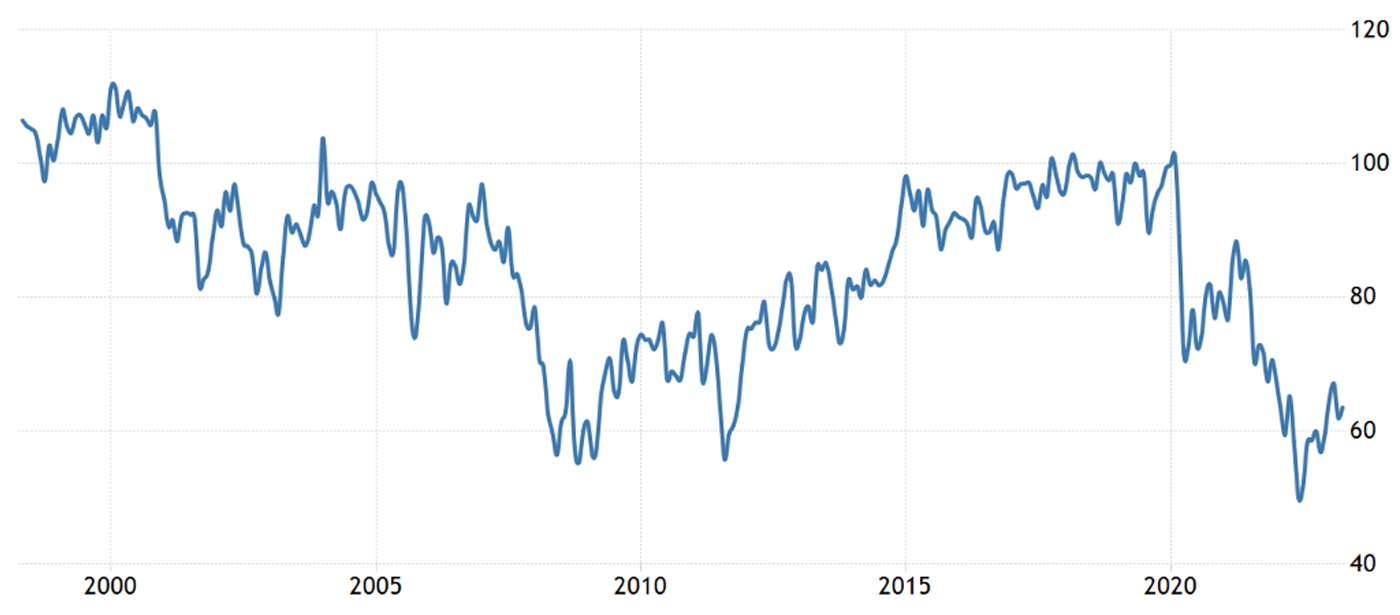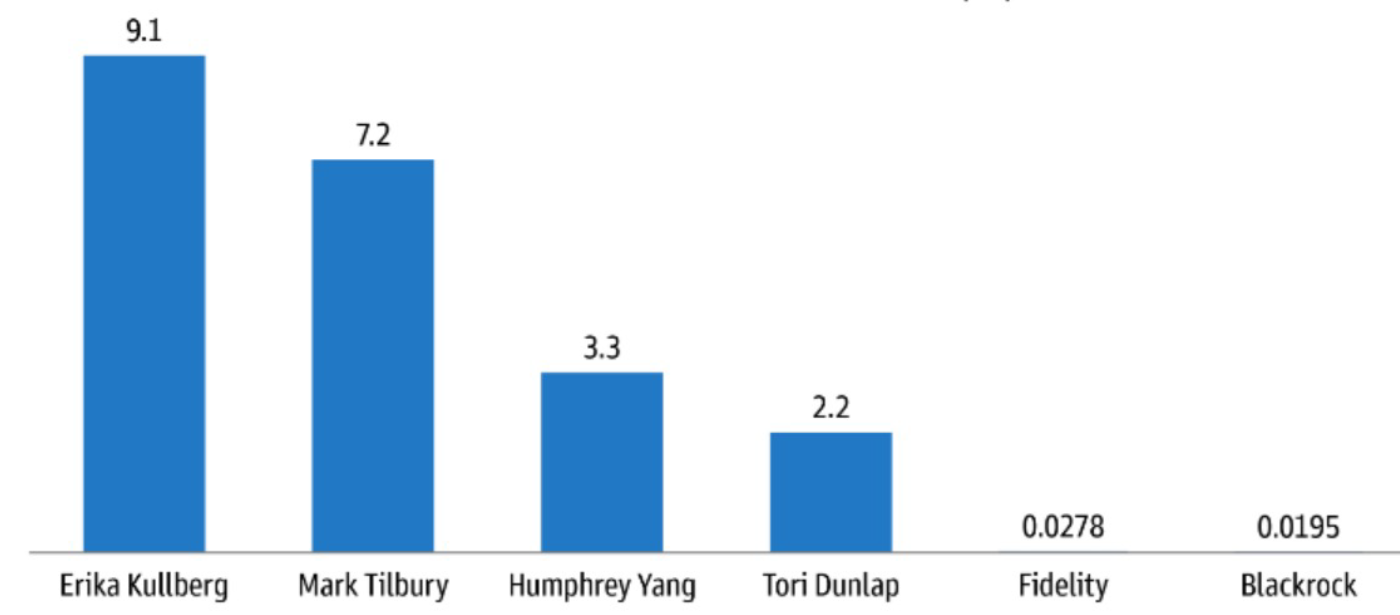Being money smart: Why financial education matters
Being money smart: Why financial education matters

Many successful financial advisors consider financial education to be one of their top priorities in working with clients. What are some of the ways they employ an educational focus in their practices?
Did you know that this past April was the 20th anniversary of Financial Literacy Month?
Financial Literacy Month was designated officially in 2003 by the U.S. Senate to start the following year during the administration of George W. Bush. (Interestingly, Barbara Bush was passionate about many literacy causes and started the Barbara Bush Foundation for Family Literacy in 1989.)
In addition to educational initiatives in April by federal and state agencies, nonprofit MoneyFit notes,
“During Financial Literacy Month, financial institutions, nonprofits, and human service agencies amplify their focus on the importance of financial literacy through events, programs, and counseling. The goal goes beyond helping consumers learn more about finances; it aims to empower them to improve their personal and household financial stability and success.”
Why is financial education so important, especially at this time?
Says MoneyFit,
“… Inflation has reached levels not seen in the past 40 years, with recent geopolitical events further exacerbating the situation in various financial sectors. Rising fuel and energy prices have caused concern for households, making it crucial for individuals to learn how to combat inflation and offset some of the adverse impacts of escalating costs.”
We also know that volatile financial markets, rising taxes in some areas, all-time high household and credit card debt, and layoffs beginning in some major sectors of the economy are adding to an uncertain financial outlook for many consumers. It is little wonder that the University of Michigan’s reporting of consumer sentiment continues to remain at depressed levels relative to historical tracking—and all the more reason why financial knowledge is so important today.
FIGURE 1: UNIVERSITY OF MICHIGAN—OVERALL CONSUMER SENTIMENT INDEX

Sources: University of Michigan Surveys of Consumers, Trading Economics
Room for improvement in financial education
There is good reason for institutional concern over financial literacy in the United States.
Gallup research (based in part on Standard & Poor’s landmark 2014–2015 Global Financial Literacy Survey) has shown that almost half of all Americans do not grasp basic financial literacy concepts and that the U.S. ranks 14th in the world in financial literacy. It’s worth noting that survey respondents, who were asked questions about several major financial concepts to determine their financial literacy, rated “risk diversification” as one of the financial concepts they understood the least.
More current research cited by Goldman Sachs shows at least one positive trend in recent years. Generation Z consumers (those born between the late 1990s and early 2010s) are starting to save for retirement at an earlier age than the preceding Generation X and millennial generations, though these same Gen Z consumers have aggregate lower assets and see high barriers to future wealth building. Specific areas of concern are the day-to-day expenses of living, rising housing costs, and the overall difficulty of saving money.
I found the following chart from Goldman to be very interesting—even though I personally do not use TikTok and had no prior knowledge of the leading financial-information influencers listed here for younger audiences, including Gen Z.
FIGURE 2: ‘FINFLUENCERS’ HAVE A HEAD START OVER TRADITIONAL MONEY MANAGERS ON SOCIAL MEDIA
Number of TikTok followers for select accounts that provide financial advice (mn)

Source: TikTok and Goldman Sachs Asset Management. As of Jan. 13, 2023. Accounts listed are not exhaustive, and follower counts are to the listed significant figures. Goldman Sachs Asset Management does not have a TikTok account. Please visit Financial Advisor IQ’s Think Tank for additional disclosures (access to the article requires an account). For illustrative purposes only.
To the point illustrated above, a Financial Planning Magazine article addresses the challenges and opportunities for financial advisors among Gen Z and millennial consumers:
“‘… The 70 million-strong cohort [Gen Z] stands to inherit at least tens of billions of dollars and assets from their parents and grandparents in coming decades. Yet 1 in 3 members may get their financial advice not from professional wealth planners, but from TikTok and YouTube, platforms permeated with myths, misperceptions and outright falsehoods dispensed by so-called experts.
“The cohort, along with millennials (what Fidelity Investments calls “Gen Y”), comprised nearly half, or 47%, of the U.S. population in 2021, but only 14% of all advisory clients, Fidelity’s 2022 Investor Insights Study shows.”
The role of advisors in financial education
Many of the financial advisors we have interviewed for Proactive Advisor Magazine consider financial education to be one of their top priorities in working with clients.
 One Delaware-based financial advisor we interviewed, Robert Ziegler, told our publication,“Developing sound financial solutions is one part of the equation in guiding clients. Effectively teaching and communicating financial concepts to clients is, in many ways, just as important.
One Delaware-based financial advisor we interviewed, Robert Ziegler, told our publication,“Developing sound financial solutions is one part of the equation in guiding clients. Effectively teaching and communicating financial concepts to clients is, in many ways, just as important.
“I consider myself a financial advisor by profession and an educator at heart. My job is to help my clients understand the various major financial aspects of the world that may impact them, as well as the pros and cons of different approaches to handling them. If I’ve done my job well, our clients will understand what I’m recommending and why—and build a sense of personal ownership of their financial plan.”
Several financial themes come up frequently from financial advisors as they describe the educational issues they discuss with clients, such as the following:
- Helping clients understand their relationship with money from a behavioral finance perspective.
- The importance of goals-based, holistic financial and investment planning.
- Why investment risk management is so important, especially for clients nearing or in retirement.
- The “power of compounding” and how that relates to the mathematics of bear market portfolio losses.
- Why the “sequence of returns” is a critical issue in helping clients plan for retirement income.
 One savvy advisor we spoke to from Wisconsin, Tony Hellenbrand, holds frequent educational seminars for prospective clients and the general public. His story about the icebreaker he uses to start his seminars relates to the wide difference between the availability of financial information and how that translates to actual knowledge and sound behavior by financial consumers:
One savvy advisor we spoke to from Wisconsin, Tony Hellenbrand, holds frequent educational seminars for prospective clients and the general public. His story about the icebreaker he uses to start his seminars relates to the wide difference between the availability of financial information and how that translates to actual knowledge and sound behavior by financial consumers:
“I have a warm-up exercise at the beginning of all of my seminars and speaking engagements that is very effective. I first ask the people in the room to indicate how they think they will do on a basic 10-question, multiple-choice quiz about investing and financial-planning issues. They have to write down the score they think they will get. I emphasize that they will not be asked to turn in their answers or be graded.
“Next, they have a few minutes to take the quiz. Here is a sample question:
“Over a long period of time, which has a bigger impact on your investment results?
A. The negative impact of missing the 10 best days of the S&P 500.
B. The positive impact of missing the 10 worst days of the S&P 500.
“Although they don’t have to turn in their quiz, from the many people who have approached me after my talks (and from papers left behind), I typically see an expected score of 9 or 10. The typical achieved score is usually between 2 and 5. This represents at least a 100% overestimation of ‘financial competence.’
“After this exercise—when people see how they have scored compared to their expectations—they are usually more open and engaged. This sets the tone that this will be an educational presentation that is focused on teaching meaningful financial concepts that they may not have been exposed to before. (By the way, the answer is ‘B.’)”
***
Many other advisors we have interviewed have their own take on the importance of financial and investment education for their clients and prospective clients. Here is a quick look at what several advisors have told our publication.
Education as part of ‘the ultimate client-service experience’
 Diana Avery is a highly experienced financial advisor in the Atlanta area. Mrs. Avery began her career working for several banks and investment companies in New York City. She then moved to Atlanta where she became a pension specialist in the 403(b) market, working in the education and health-care sectors. She later founded her own advisory practice, Avery Financial Services.
Diana Avery is a highly experienced financial advisor in the Atlanta area. Mrs. Avery began her career working for several banks and investment companies in New York City. She then moved to Atlanta where she became a pension specialist in the 403(b) market, working in the education and health-care sectors. She later founded her own advisory practice, Avery Financial Services.
She says, “I want my clients to feel that I am giving them the ultimate client-service experience. I have studied a lot of top firms across different industries and understand that the client experience is really what separates the best ones. … Part of this pursuit of service excellence is in creating a warm, enjoyable, welcoming environment for clients. … Of course, the real key to success as an advisor is in providing high-quality, professional guidance that helps people move forward in their financial lives in a positive manner. …
“I decided that in becoming an independent financial advisor I wanted to greatly enhance my knowledge base and professional skills in the planning area. I studied to become a Certified Financial Planner (CFP) and found that to be a very rewarding experience. I believe in the CFP planning process and the fiduciary standard and apply those rigorously with my clients. …
“We believe everyone should feel more confident about their financial future. Our firm’s chief priority is to guide clients through ongoing education and financial planning that can adapt to changes in their life priorities. Through seeing how all of the financial pieces of their lives fit together, clients will hopefully be able to successfully navigate the path to financial independence and security for their retirement years.”
Managing client expectations
 Bryan Nakamoto is a financial advisor and co-owner of Spectrum Wealth Management, LLC, based in Honolulu, Hawaii. Mr. Nakamoto’s firm provides a comprehensive range of financial services. He says that his firm is committed to a high level of customer service for clients as he and they “work together toward meeting specific financial goals.” An important part of his overall planning is making sure client expectations are clearly defined throughout all stages of the process.
Bryan Nakamoto is a financial advisor and co-owner of Spectrum Wealth Management, LLC, based in Honolulu, Hawaii. Mr. Nakamoto’s firm provides a comprehensive range of financial services. He says that his firm is committed to a high level of customer service for clients as he and they “work together toward meeting specific financial goals.” An important part of his overall planning is making sure client expectations are clearly defined throughout all stages of the process.
He says, “Taking action also means having an educational focus at the forefront of everything we do for clients. I want our clients to be well-informed partners in the decision-making process when it comes to building a financial and investment plan. A big part of this is managing client expectations from the outset of the relationship. By thoroughly, yet simply, explaining the intended course of action, the rationale behind it, potential pitfalls, the time horizon involved, and the benefit to the client, we can help prevent emotion-driven decision-making.
“This becomes especially important in an investment environment when a market downturn occurs. The client should thoroughly understand the long-term strategy we have jointly constructed, understand the parameters of how it will likely perform in both favorable and unfavorable market conditions, and be aware of the risk-management strategies being used for their portfolio. Knowing those parameters going into periods of market stress makes it much easier for clients to stick with their investment plan.”
Helping clients see the big picture of retirement planning
 Tedd Bradley is a partner at Vantage Point Wealth Management in Minnesota. He has been in the financial-services industry for over two decades, helping individuals pursue their goals. He specializes in comprehensive planning and has extensive experience with investment portfolio design, estate planning, and retirement-income planning.
Tedd Bradley is a partner at Vantage Point Wealth Management in Minnesota. He has been in the financial-services industry for over two decades, helping individuals pursue their goals. He specializes in comprehensive planning and has extensive experience with investment portfolio design, estate planning, and retirement-income planning.
Mr. Bradley says, “When thoughts of retirement start to surface, most people are at the very high point of their lives in terms of earning power. They start to contemplate a future without that job income, when they are not adding to their investments, and, instead, will start depleting their lifelong savings and investments. That can be a scary scenario.
“I see my challenge as helping clients unravel an equation that doesn’t seem to be working in their favor. I want to help provide the financial education for retirees and potential solutions that will help them face retirement and their financial future with more confidence than they thought possible.
He adds, “I conduct regular seminars and workshops for the public on the topics of retirement planning and Social Security strategies. …
“We cover topics such as life planning for retirement and thinking about objectives; determining retirement needs, expenses, and income; identifying common retirement mistakes; managing distributions; estate planning; investment alternatives; and risk management and asset protection. This comprehensive course helps pre-retirees and retirees see the big picture in planning for their financial future.”
Using financial education to attract and retain clients
 Janice Hammond is the founder of Sunrise Financial Services, an independent financial firm serving the greater Seattle area. She transitioned from the worlds of banking, real estate, and mortgage lending to starting her own successful advisory practice several years ago.
Janice Hammond is the founder of Sunrise Financial Services, an independent financial firm serving the greater Seattle area. She transitioned from the worlds of banking, real estate, and mortgage lending to starting her own successful advisory practice several years ago.
Ms. Hammond talks about how financial education plays a valuable role in several aspects of her firm’s business development approach:
“Although my job title is financial advisor, I think of myself as a steward or guide helping people along the journey to a comfortable retirement. If I can help alleviate a client’s anxiety about retirement planning and structure a plan that will help them meet their goals, they can then focus on the meaningful things in their lives. …
She continues, “We host many events centered on financial education throughout the year to attract new clients and to build relationships with current clients. Our team member in charge of community relations and events does an excellent job at coordinating our marketing and educational programs. Our clients and their families gain value from the important information we provide and the opportunity to get to know our firm’s philosophy and team.
“To help educate and develop our relationships with current clients, we hold periodic lunch-and-learn seminars and bigger events about twice a year. We frequently invite experts on specific financial topics or representatives from one of the investment firms we work with to present. We also encourage our clients to bring friends or family members if they think the topic might be of interest to them. If our presentation appeals to a guest and they become a new client, that is just an additional benefit.”
The opinions expressed in this article are those of the author and do not necessarily represent the views of Proactive Advisor Magazine. These opinions are presented for educational purposes only.
New this week:
 David Wismer is editor of Proactive Advisor Magazine. Mr. Wismer has deep experience in the communications field and content/editorial development. He has worked across many financial-services categories, including asset management, banking, insurance, financial media, exchange-traded products, and wealth management.
David Wismer is editor of Proactive Advisor Magazine. Mr. Wismer has deep experience in the communications field and content/editorial development. He has worked across many financial-services categories, including asset management, banking, insurance, financial media, exchange-traded products, and wealth management.
